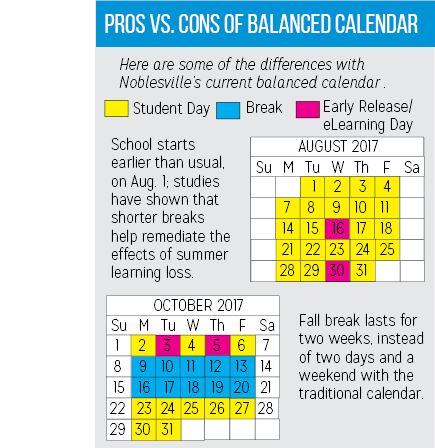The calendar committee is beginning to research changes for the next three years after 2017-18, such as a balanced calendar, flex days and “E-days”, according to Dr. Amy Dudley, head of the calendar committee and Assistant Superintendent of Curriculum, Instruction and Assessment. The 2017-18 school year will be similar to the current school year, with few changes.
Zane Snider, calendar committee member and junior, said that next year, fall break will be on Thursday and Friday instead of Friday and Monday for next year, and there will be an extra teacher day before school starts.
For the three schools years after 2017-18, Dudley said the committee will be conducting research on the benefits and disadvantages of a balanced calendar.
Dudley said, “We are focused on student learning, both academic learning and social immersion learning. We want to make sure that we have a calendar supportive of that.”
To make a decision, the committee will look at studies, other schools already using a balanced calendar and community feedback. After gathering their research and determining a recommendation, the committee will submit their plan to the school board to approve.
“We’ll also look at other research studies done so far on how does the balanced calendar affect learning for students, academically,” Dudley said.

She said the calendar committee will talk to Noblesville Schools to see the changes it has seen since its switch. More specifically, Snider said the committee would want to know how attendance rates and standardized test scores have been affected.
To gather community feedback, Dudley says the school will administer a survey in the spring to get opinions from the students through a program called ThoughtExchange. In the survey, students will answer three or four questions on their preferences.
Dudley said, “[Students will] be able to answer open ended questions- they’ll be able to answer their preferences and explain why it is important to them. And then they’ll be able to see the thoughts of all the other students, and they’ll be able to star what’s most important to them.”
However, according to Snider, large changes have not been previously implemented because of the many factors the committee has to consider. For example, with E-days, the committee has to consider the possibility of a student not having a computer or reliable Wi-fi connection.
“Ultimately we haven’t started that research yet, but we will be,” he said.































![What happened to theater etiquette? [opinion]](https://hilite.org/wp-content/uploads/2025/04/Entertainment-Perspective-Cover-1200x471.jpg)














































![Review: “The Immortal Soul Salvage Yard:” A criminally underrated poetry collection [MUSE]](https://hilite.org/wp-content/uploads/2025/03/71cju6TvqmL._AC_UF10001000_QL80_.jpg)
![Review: "Dog Man" is Unapologetically Chaotic [MUSE]](https://hilite.org/wp-content/uploads/2025/03/dogman-1200x700.jpg)
![Review: "Ne Zha 2": The WeChat family reunion I didn’t know I needed [MUSE]](https://hilite.org/wp-content/uploads/2025/03/unnamed-4.png)
![Review in Print: Maripaz Villar brings a delightfully unique style to the world of WEBTOON [MUSE]](https://hilite.org/wp-content/uploads/2023/12/maripazcover-1200x960.jpg)
![Review: “The Sword of Kaigen” is a masterpiece [MUSE]](https://hilite.org/wp-content/uploads/2023/11/Screenshot-2023-11-26-201051.png)
![Review: Gateron Oil Kings, great linear switches, okay price [MUSE]](https://hilite.org/wp-content/uploads/2023/11/Screenshot-2023-11-26-200553.png)
![Review: “A Haunting in Venice” is a significant improvement from other Agatha Christie adaptations [MUSE]](https://hilite.org/wp-content/uploads/2023/11/e7ee2938a6d422669771bce6d8088521.jpg)
![Review: A Thanksgiving story from elementary school, still just as interesting [MUSE]](https://hilite.org/wp-content/uploads/2023/11/Screenshot-2023-11-26-195514-987x1200.png)
![Review: "When I Fly Towards You", cute, uplifting youth drama [MUSE]](https://hilite.org/wp-content/uploads/2023/09/When-I-Fly-Towards-You-Chinese-drama.png)
![Postcards from Muse: Hawaii Travel Diary [MUSE]](https://hilite.org/wp-content/uploads/2023/09/My-project-1-1200x1200.jpg)
![Review: "Ladybug & Cat Noir: The Movie," departure from original show [MUSE]](https://hilite.org/wp-content/uploads/2023/09/Ladybug__Cat_Noir_-_The_Movie_poster.jpg)
![Review in Print: "Hidden Love" is the cute, uplifting drama everyone needs [MUSE]](https://hilite.org/wp-content/uploads/2023/09/hiddenlovecover-e1693597208225-1030x1200.png)
![Review in Print: "Heartstopper" is the heartwarming queer romance we all need [MUSE]](https://hilite.org/wp-content/uploads/2023/08/museheartstoppercover-1200x654.png)



